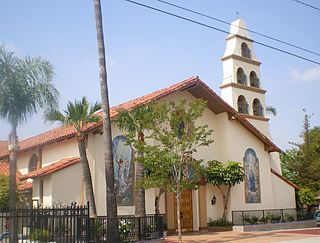
San Fernando is a general-law city in the San Fernando Valley region of Los Angeles County, California, in the Los Angeles metropolitan area. It is an enclave in the City of Los Angeles. As of the 2020 census the population of San Fernando was 23,946.
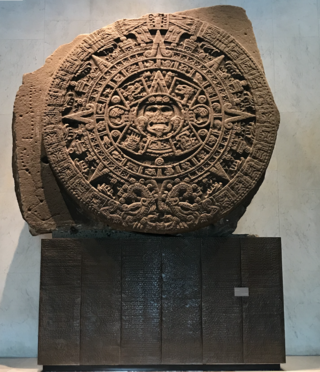
The Aztec or Mexica calendar is the calendrical system used by the Aztecs as well as other Pre-Columbian peoples of central Mexico. It is one of the Mesoamerican calendars, sharing the basic structure of calendars from throughout the region.
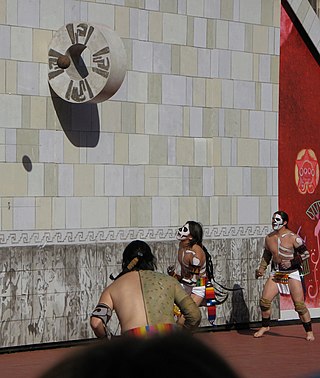
The Mesoamerican ballgame was a sport with ritual associations played since at least 1650 BC by the pre-Columbian people of Ancient Mesoamerica. The sport had different versions in different places during the millennia, and a modernized version of the game, ulama, is still played by the indigenous populations in some places.

Ollama is a ball game played in Mexico, currently experiencing a revival from its home in a few communities in the state of Sinaloa. As a descendant of the Aztec version of the Mesoamerican ballgame, the game is regarded as one of the oldest continuously played sports in the world and as the oldest known game using a rubber ball.

Basque pelota is the name for a variety of court sports played with a ball using one's hand, a racket, a wooden bat or a basket, against a wall or, more traditionally, with two teams face to face separated by a line on the ground or a net. The roots of this class of games can be traced to the Greek and other ancient cultures.
Batéy was the name given to a special plaza around which the Caribbean Taino built their settlements. It was usually a rectangular area surrounded by stones with carved symbols (petroglyphs).

Lacrosse has its origins in a tribal game played by eastern Woodlands Native Americans and by some Plains Indians tribes in what is now the United States of America and Canada. The game was extensively modified by European settlers to create its current collegiate and professional form.

The most popular sport in Mexico currently is association football followed by boxing. However, there are regional variations: for example, baseball is the most popular sport in the northwest and the southeast of the country. Charrería is the national sport of Mexico. American rodeo is also popular in Mexico, but primarily in the northern half of the country. Basketball, American football and bull riding are also popular. Other sports followed by Mexicans are ice hockey, mixed martial arts, motorsports, taekwondo, and cycling. The tradition of bullfighting remains strong in Mexico.
Mesoamerican creation myths are the collection of creation myths attributed to, or documented for, the various cultures and civilizations of pre-Columbian Mesoamerica and Mesoamerican literature.

Mesoamerica is a historical region and cultural area that begins in the southern part of North America and extends to the Pacific coast of Central America, thus comprising the lands of central and southern Mexico, all of Belize, Guatemala, El Salvador, and parts of Honduras, Nicaragua and Costa Rica. As a cultural area, Mesoamerica is defined by a mosaic of cultural traits developed and shared by its indigenous cultures.

A Mesoamerican ballcourt is a large masonry structure of a type used in Mesoamerica for more than 2,700 years to play the Mesoamerican ballgame, particularly the hip-ball version of the ballgame. More than 1,300 ballcourts have been identified, 60% in the last 20 years alone. Although there is a tremendous variation in size, in general all ballcourts are the same shape: a long narrow alley flanked by two walls with horizontal, vertical, and sloping faces. Although the alleys in early ballcourts were open-ended, later ballcourts had enclosed end-zones, giving the structure an -shape when viewed from above.
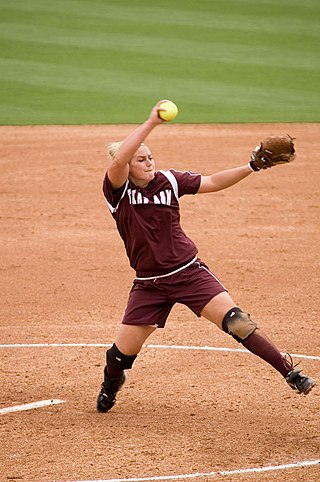
Fastpitch softball, or simply fastpitch, is a form of softball played by both women and men. While the teams are most often segregated by sex, coed fast-pitch leagues also exist. Considered the most competitive form of softball, fastpitch is the format played at the Olympic Games. Softball was on the International Olympic Committee (IOC) program in 1996, 2000, 2004, 2008, and 2020. It will not be a part of the 2024 Summer Olympic Games in Paris.

Pelota mixteca is a team sport similar to a net-less tennis game. The players wear sturdy, elaborately decorated gloves affixed to a heavy flat striking surface, using them to strike a small solid ball. The game has roots extending back hundreds, or perhaps thousands, of years.

Ancient Mesoamericans were the first people to invent rubber balls, sometime before 1600 BCE, and used them in a variety of roles. The Mesoamerican ballgame, for example, employed various sizes of solid rubber balls and balls were burned as offerings in temples, buried in votive deposits, and laid in sacred bogs and cenotes.
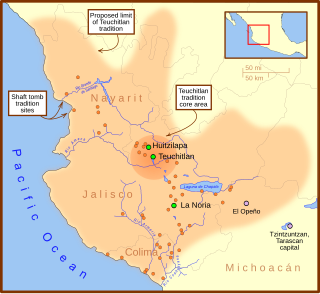
The Teuchitlán culture was one of several related cultures in West Mexico during the Late Formative to Classic period. Situated in the Tequila Valleys of Jalisco, the Teuchitlán culture shared in the tradition of burying some of their dead in shaft and chamber tombs. Archaeological work from the past few decades have demonstrated that West Mexico was not occupied by one homogeneous culture, historically referred to as the shaft tomb tradition, that stretched from Nayarit, Jalisco, and Colima. Instead, West Mexico was composed of multiple cultures with several distinct commonalities.
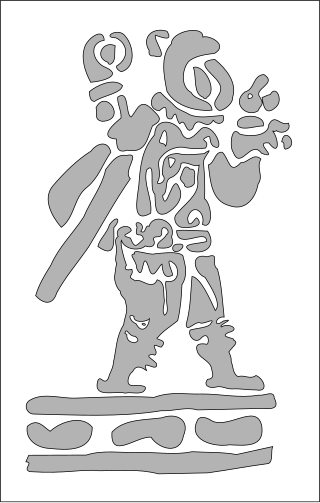
Dainzú is a Zapotec archaeological site located in the eastern side of the Valles Centrales de Oaxaca, about 20 km south-east of the city of Oaxaca, Oaxaca State, Mexico. It is an ancient village near to and contemporary with Monte Albán and Mitla, with an earlier development. Dainzú was first occupied 700-600 BC but the main phase of occupation dates from about 200 BC to 350 AD. The site was excavated in 1965 by Mexican archaeologist Ignacio Bernal.

Wheelchair Football is a fast-paced sport that is best played when athletes are in maximum physical condition, and at the top of their game in teamwork, strategy and wheelchair-handling skills, for both manual wheelchair and power wheelchair users.

Sports in San Diego includes two major professional league teams, other highest-level professional league teams, minor league teams, and college athletics. The San Diego Padres compete in Major League Baseball (MLB). San Diego FC begins play in Major League Soccer (MLS) in 2025. The San Diego State Aztecs compete in NCAA Division I (FBS). The Farmers Insurance Open, a professional golf tournament on the PGA Tour, is played annually at Torrey Pines Golf Course.

Pelota purépecha, called Uárukua Ch'anakua in the Purépecha language, is an Indigenous Mexican sport similar to those in the hockey family. A common variant, distinguished as pasárutakua in Purépecha, uses a ball which has been set on fire and can be played at night. It has a league, several practicing communities and about 800 players across Mexico as of 2010. It is one of 150 pre-Hispanic Mexican games at risk of dying out along with Ulama.

In sports, the term diamond sports refers to recreational variants of baseball, a bat-and-ball sport. The most popular and closely related sport to baseball is softball, with the two sports being administered internationally by the World Baseball Softball Confederation, alongside Baseball5.

















